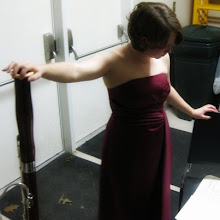F, B, D#, G#.
Why are they such a big deal? Tristan: What is the deal? Why are you so important? I understand riots about Rite of Spring. Rite of Spring is violent and intense and not what people expected to see and hear. But the Tristan Chord is so... pretty. And true, no one rioted over the Tristan chord. But historically it's so important. It ends 200 years of functional harmony. And I keep staring at it, waiting for the epiphany of how those four notes combine to make something so controversial. Other people used the same chord before Wagner; but not in the same way--it was functional, in other places. I suppose simply because I wasn't born until the 80s, because there's been 100 or so years of nonfunctional harmony in my ears since birth, it doesn't sound as important to me as it does to Wagner's audience and contemporaries.
But I look at the Tristan chord, and it gives me hope. If Tristan can be so organic, so effortless and yet so influential, then maybe I can be influential. Maybe history classes will throw my name around like a close friend.
Fingers crossed.
Saturday, December 8
Posted by
bridget
at
17:04
![]()
Subscribe to:
Post Comments (Atom)

0 comments:
Post a Comment